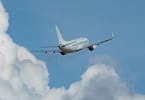Air New Qantas? Singapore Virgin? Air Tiger X? The idea of super carriers ruling the skies has been talked about almost as long as airlines have been around.
However, the appeal of airline consolidation gained momentum this year as fuel prices soared, about two dozen airlines collapsed or filed for bankruptcy, airline executives started thinking about the costs of climate change, and Boeing and Airbus finally started delivering a backlog as demand softened.
The year has played out like an airline soap opera as airlines flirted with each other.
In April, US airlines Delta and Northwest took the plunge to form the world’s largest airline. In recent months British Airways has been chatting up Spain’s Iberia, and Europe’s second-largest carrier Lufthansa, only three years since its marriage to Swiss International, is seeking another partner in Austrian Airlines, which is also being wooed by S7, Russia’s second-largest airline.
Besides Singapore Airlines’ thwarted pursuit of China Eastern Airlines in January, airlines in the southern hemisphere have received very little attention of late.
Whatever the airline combination, consolidation in the Asia-Pacific region has been traditionally fraught by protectionism, regulatory obstacles and strategic blunders that have sabotaged numerous attempts by airlines to get together and stay together.
Qantas chief executive Geoff Dixon used his farewell profit result last month to give it one last shot, calling on the Government to get out of the way of airlines wanting to merge. “I have been talking about (consolidation) since the day I took over at Qantas. It is inevitable,” he said. ” It has come a little slower than I would have thought, but it is accelerating more now than I would have thought.
” I think in coming years Australians in general and authorities are going to have to realise that as strong as Qantas is and as big as it is, there will have to be some form of consolidation.
“… I think a level of maturity and a level of understanding when this debate takes place, as it inevitably will, I think will be very much needed because airlines cannot continue the way things are.”
This month the International Air Transport Association said it expected the airline sector to post $US9.3 billion ($A11 billion) losses over the next two years.
And while the oil price fell to almost $US100 a barrel last week, providing respite from highs of about $US145 a barrel earlier in the year, it is still well above its $US25-a-barrel price when Dixon took over at Qantas in 2001.
Air travel remained robust in the first half of the year but IATA now expects 2.8% annual growth, down from 5.3% last year. Airline operating profit has been revised down from $US16.3 billion in 2007 to $US300 million in 2008.
At least 25 airlines have gone under since the start of 2008 and others are not expected to see Christmas.
IATA chief executive Giovanni Bisignani believes the industry is in crisis and that the rules need to change to make it easier for airlines to merge if necessary.
“If there is one message from the dozens of airlines that have gone bust so far this year, it is that fundamental change cannot wait,” he said.
“We need governments to think boldly. They must say good-bye to the outdated structures put in place to defend flag carriers. Today these very structures threaten our viability. We need commercial freedoms to act like any other business.”
Governments have begun to act. In March an open skies agreement between the US and the European Union came into effect, allowing any airline from either jurisdiction to fly to any point within the other.
Further talks are scheduled for this month with several hurdles remaining, most notably the restrictions imposed on EU carriers investing in American airlines.
While restrictions have been lifted on EU carriers buying majority stakes in US airlines, their voting rights remain capped at 25%. Negotiators will move swiftly to get a deal locked away before the US election in November, fearing a Barack Obama-led government will be less accommodating.
At home, the Federal Government will use its aviation white paper, to be released next year, as the basis for a review of international liberalisation, regulatory reform and foreign ownership.
Already this year it has signed an open skies agreement with the US and is in talks with the EU for a similar agreement. The ownership issue, however, remains tricky.
The Qantas Sales Act stipulates that no foreign airline can own more than 25% of Qantas and no group of airlines can acquire any more than 35% of the flag carrier. Foreign ownership is restricted to 49%.
Having fought against the Howard government’s sell-off of Telstra, Labor will be in a compromising political position if it agrees to a similar sell-off of Qantas.
Any such plans would meet strong union opposition and would presumably be as unpopular with the public as last year’s failed private equity bid.
Past attempts by Singapore Airlines to merge or form a regional alliance with Qantas have been unable to get around the Qantas Sales Act. Several Qantas plays to snare Air New Zealand have been blocked by competition regulators on both sides of the Tasman and the New Zealand High Court. Centre for Asia Pacific Aviation executive chairman Peter Harbison believes consolidation in the region could be up to 10 years away and is unlikely to include Qantas.
“My view is that, yes, these European carriers will get big,” he said. “Air France and Lufthansa will try and extend their consolidation into the regions. But it is going to be a long time coming here because it is so complex and there is too much nationalism for that.
“One of the most attractive targets in the region at the moment is Virgin Blue. If it could team with Air New Zealand it would become a … powerful competitor to Qantas.
“It wouldn’t suffer from the competition restrictions and it would allow Air New Zealand access to the Australian domestic network. If you had a spare $5 billion or $10 billion it really is a marriage made in the bank.”
However, Qantas’ $969.7 million record profit this year, a 44% increase, is unlikely to convince anyone that Qantas is doing it tough or sway sympathy towards allowing it greater freedom.
Air travel remained robust in the first half of the year but IATA now expects 2.8% annual growth, down from 5.3% last year. Airline operating profit has been revised down from $US16.3 billion in 2007 to $US300 million in 2008.
At least 25 airlines have gone under since the start of 2008 and others are not expected to see Christmas.
IATA chief executive Giovanni Bisignani believes the industry is in crisis and that the rules need to change to make it easier for airlines to merge if necessary.
“If there is one message from the dozens of airlines that have gone bust so far this year, it is that fundamental change cannot wait,” he said.
“We need governments to think boldly. They must say good-bye to the outdated structures put in place to defend flag carriers. Today these very structures threaten our viability. We need commercial freedoms to act like any other business.”
Governments have begun to act. In March an open skies agreement between the US and the European Union came into effect, allowing any airline from either jurisdiction to fly to any point within the other.
Further talks are scheduled for this month with several hurdles remaining, most notably the restrictions imposed on EU carriers investing in American airlines.
While restrictions have been lifted on EU carriers buying majority stakes in US airlines, their voting rights remain capped at 25%. Negotiators will move swiftly to get a deal locked away before the US election in November, fearing a Barack Obama-led government will be less accommodating.
At home, the Federal Government will use its aviation white paper, to be released next year, as the basis for a review of international liberalisation, regulatory reform and foreign ownership.
Already this year it has signed an open skies agreement with the US and is in talks with the EU for a similar agreement. The ownership issue, however, remains tricky.
The Qantas Sales Act stipulates that no foreign airline can own more than 25% of Qantas and no group of airlines can acquire any more than 35% of the flag carrier. Foreign ownership is restricted to 49%.
Having fought against the Howard government’s sell-off of Telstra, Labor will be in a compromising political position if it agrees to a similar sell-off of Qantas.
Any such plans would meet strong union opposition and would presumably be as unpopular with the public as last year’s failed private equity bid.
Past attempts by Singapore Airlines to merge or form a regional alliance with Qantas have been unable to get around the Qantas Sales Act. Several Qantas plays to snare Air New Zealand have been blocked by competition regulators on both sides of the Tasman and the New Zealand High Court. Centre for Asia Pacific Aviation executive chairman Peter Harbison believes consolidation in the region could be up to 10 years away and is unlikely to include Qantas.
“My view is that, yes, these European carriers will get big,” he said. “Air France and Lufthansa will try and extend their consolidation into the regions. But it is going to be a long time coming here because it is so complex and there is too much nationalism for that.
“One of the most attractive targets in the region at the moment is Virgin Blue. If it could team with Air New Zealand it would become a … powerful competitor to Qantas.
“It wouldn’t suffer from the competition restrictions and it would allow Air New Zealand access to the Australian domestic network. If you had a spare $5 billion or $10 billion it really is a marriage made in the bank.”
However, Qantas’ $969.7 million record profit this year, a 44% increase, is unlikely to convince anyone that Qantas is doing it tough or sway sympathy towards allowing it greater freedom.






















